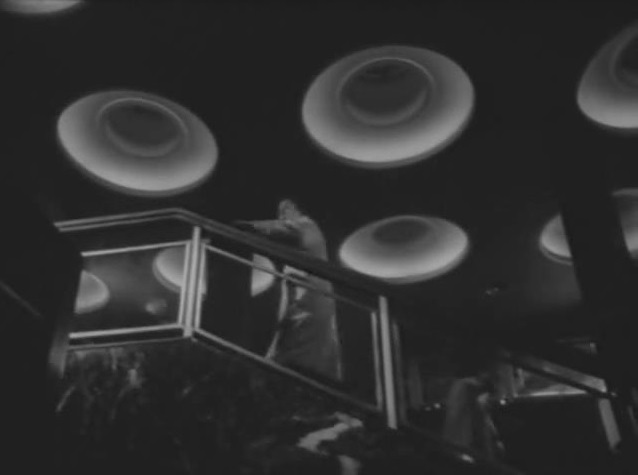Time Is My Enemy
The blighter who
conveniently demobbed in the Blitz comes back from
the dead for getaway cash after shooting a jeweler during a holdup.
The widow is
married to a London publisher who jocularly complains of his stalwarts, catering
to their whims means driving far out and arriving “dead on seven”.
Scotland Yard is
a friend to the family, the gang is well known for its modus operandi.
Danger Within
The Italians have
a man in camp under the guise of a British officer,
this informer is thought to be a Greek lieutenant actually working for British
counterespionage on the trail of the Italian agent.
Life in a POW
camp, 1943. The Germans are set to take over, the Greek is dead, the informer
must be found, a mass escape is planned during a
performance of Hamlet.
Eugene Archer of
the New York Times liked the film in spite of himself, thinking as he
said that a certain element of comedy “slows the pace”. Time Out
Film Guide similarly admires the pic but has it
slightly muddled.
Greyfriars Bobby, the true story of a dog
The film is handled in two movements
(Blake Edwards adds a third, with S.O.B.).
De Sica’s Umberto D. brings
the story to Edinburgh, where Seaton’s Miracle on 34th
Street settles the matter.
A
Matter of WHO

Capital comedy on
the most serious of issues, bribery, barratry, corruption. “You know, Ivanovitch, you’re a carrier of corruption that may never be found.”
The influence of
Ealing is palpable and well-studied, also Reed (Night Train to Munich, The
Third Man).
A
paragon of style, a reference point much-imitated.
Bosley
Crowther of the New
York Times, “a lively little treat.” TV Guide, “a strange idea for a
comedy”. Hal Erickson (All Movie
Guide), “a curious subject for a British comedy.” Halliwell’s Film Guide, “not
really a starter.”
The Argo,
Hercules, Medea, the Golden Fleece.
The treachery of Pelias, his misrule of Thessaly.
The giant figure
of Talos, the Harpies, Poseidon, the Seven-Headed
Hydra and the skeleton army sown from its teeth.
The games of
Mount Olympus, Zeus and Hera. Hermes, the messenger of the gods.
A Jolly Bad Fellow
“Whom the
gods would destroy, they first make mad,” a university research chemist
achieves this with a preparation tested on rats and later applied to boring
ninnies, the result is exactly described in Richard Quine’s How to Murder Your Wife, famously, or as
Beckett says,
|
Wit
in fools has something shocking |
An exquisite
film, though A.H. Weiler of the New York Times didn’t think so, neither does Halliwell’s Film Guide, nor Time Out (“still
manages a grinning gusto”).
The institution
is U. of Ockham, or Occam, elegantissime.
One Million Years B.C.
The creation of
the world, the dawn of man.
Huston’s The
Bible: In the Beginning... and Kubrick’s 2001: A Space Odyssey
are concurrent. The story is from Hal Roach Studios.
A work of genius
crowned by Harryhausen’s giant lizards.
“Shocking
falls” drive Tumak into Loana’s
arms and back to his brutish people, a calamitous war ends in volcanic tumult (The
Ten Commandments), the cavemen wend their way through barren wastes.
|
...the ribs and blood of the earth, from
which all fables grow, established poetry
and truth in us. |
The Three Lives of Thomasina
A most complex
allegory, scarcely to be taken at face value and yet filmed with punctilious
realism by a master director and a proficient crew.
The workings of
nature, the state of grace, the functions of science, the love of animals and
“my cat Hodge” are all elements in it.
The veterinary
surgeon, a cold customer, for the first life.
The village
witch, a crofter at her loom, for the second.
The two united at
last.
A ginger tabby
narrates the tale.
Arrival
The Prisoner
The domain of No.
2, a seaside village, “your village”, a storybook something or other,
somewhere, and one is No. 6.
No possibility of
escaping, everything very deceptive, and one is questioned.
Chaffey has a strong flurry of direction to convey the
bewildering sense of fathomless predicament, before establishing the rhythm of
the place.
The Chimes of Big Ben
The Prisoner
They are an hour
off from the standpoint of a Polish resister thirty miles from the Village in
Lithuania, which is where Olympic swimmer and fellow captive Nadia (No. 8, an
Estonian) says it is, on the Baltic Sea.
The very pungent
joke has No. 6 enter an Exhibition of Arts & Crafts and win the prize and
travel to Danzig and Copenhagen and London, nowhere
at all.
A secondary joke
has every blessed entry but his a portrait of the Village Chairman, No. 2.
Mother Angel
Charlie’s
Angels
The little girl
is fascinated by her relative’s suitor (jealous, says her guardian), the
man raises Venus Flytraps, she slips in to admire and
feed them.
A man wants him
to go back to Boston and is killed before her eyes, she leaves hastily, unseen
but not unheard.
Jill takes the
girl under her protective wing, the child is very
clever and gives her a turn or two.
The remarkable
substance of the story is reserved for the end, a jewel robbery, a bail jumper.
This leaves various elements in raw suspension throughout.
Angels on the Street
Charlie’s
Angels
The concert
violinist’s daughter is menaced and beaten by a furious pimp outside the
conservatory of music she runs with her father. The angels take lessons, meet a particularly tough streetwalker who
admonishes them.
The pimp is faced
down on the street with his girl at gunpoint, and beats a retreat. The enigma
of his senseless attacks on the frail musician can’t be understood until
she’s watched long enough to reveal her alter ego as the streetwalker
regularly beaten for failing to meet her quota.
Chaffey handles this for the surprise, which is as well
done as anything of its kind, an elaborate preparation made to look offhand in
the telling.